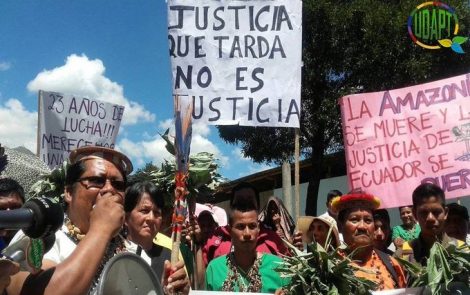At the last minute, the State Attorney General’s Office of Ecuador informed the Union of People Affected by Texaco (UDAPT) that it had begun the appeal process of the arbitration award in favor of Chevron in The Hague.
In November, UDAPT warned in a statement that the arbitration award issued ordered the Ecuadorian State “to violate judicial autonomy and interfere in a private case, which is unconstitutional and contrary to national sovereignty and human rights.”
In a recent interview with Real World Radio, Pablo Fajardo, legal representative with UDAPT, explained the implications that it would have on a social, environmental and economic level, if Ecuador did not appeal the ruling, whose limit expired on December 16: the panel of arbitrators of the court would have imposed a millionaire sum of money that the State should pay Chevron for understanding that its image was “affected” during the more than 25 years of trial that this case is leading. The funds for this would come from the debt contracted by Ecuador with the International Monetary Fund (IMF).
“Money is being set aside to pay Chevron a debt that is not legitimate, that is illegal and is due to a human rights violation,” Fajardo told RWR, demanding that the attorney general appeals the arbitration award.
If they had not appealed, it would have been a “terrible precedent in which the economic rights of transnational corporations would continue to be imposed on human rights,” added the legal representative with UDAPT.
Finally, on December 15, regarding the legal limit to appeal, the State Attorney General’s Office, representing the interests of Ecuador, notified Chevron of its decision to file an appeal against the judgment issued on September 16, 2020, by the District Court of The Hague, Netherlands. In a communication sent to UDAPT on December 16, the prosecutor affirms that “he will execute all the actions provided under the Law to safeguard the national heritage and the public interest in all cases.”
From UDAPT, people affected by pollution and violations of the collective rights of the peoples of the Amazon, thanked “the massive support” for this cause “in all corners of the world.”
Fajardo added that this pressure in arbitration tribunals on those affected by environmental crimes committed by transnational companies in their different extractivist projects, reflects once again “the need for a Binding Treaty [1] that allows a reduction of the asymmetry, the difference or the distance that exists between access to the justice of the peoples and the criminality committed by transnational companies”.
